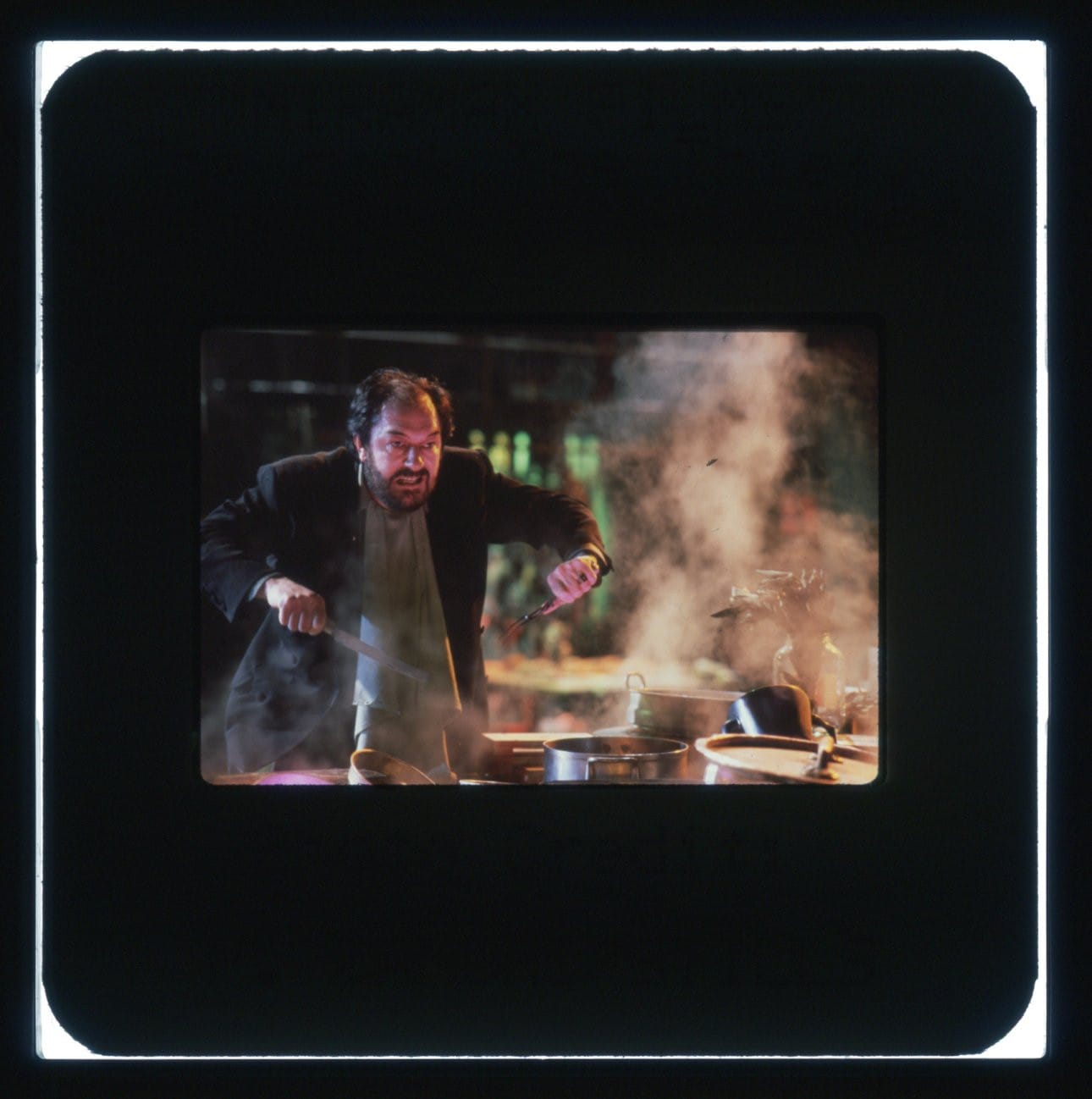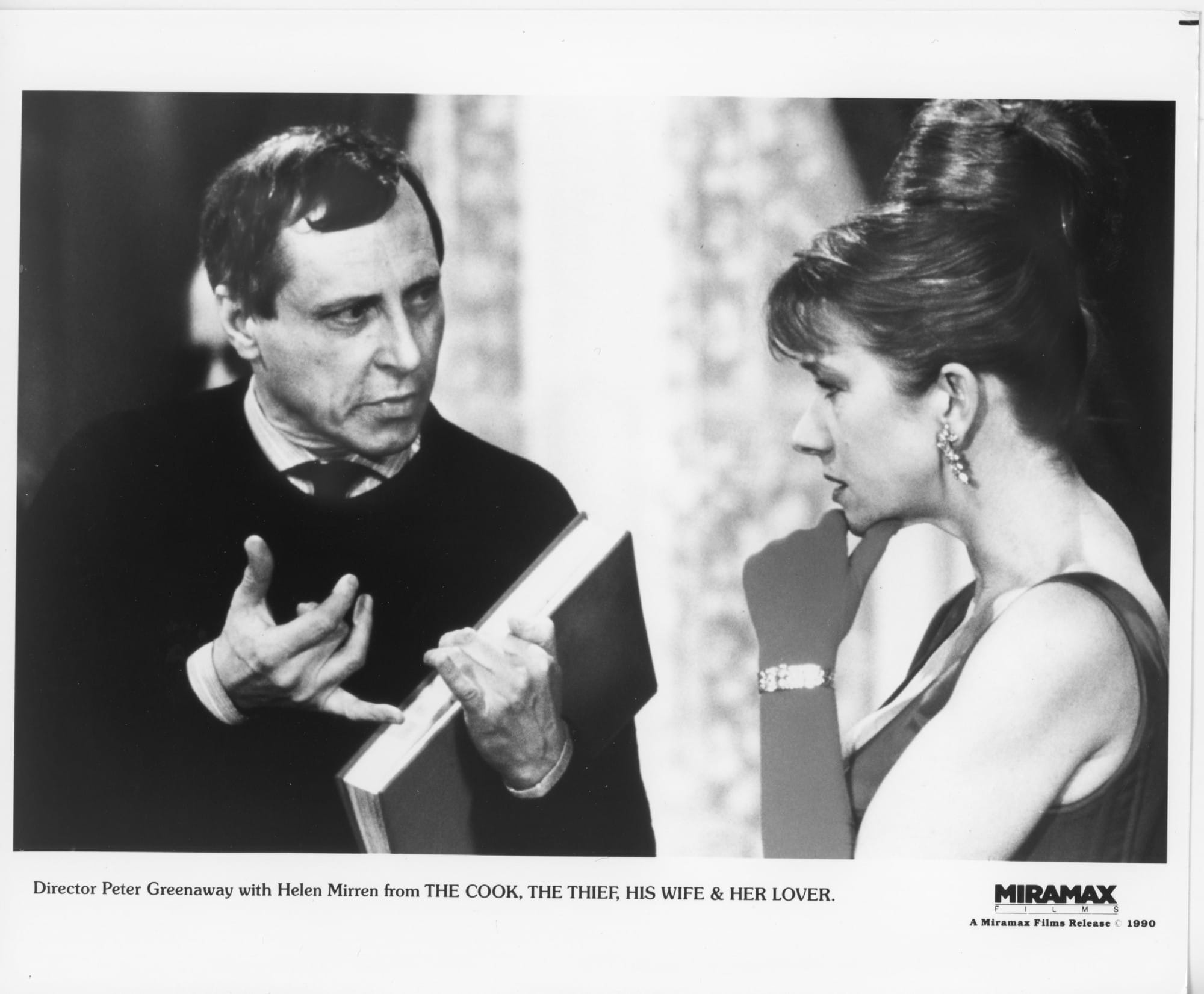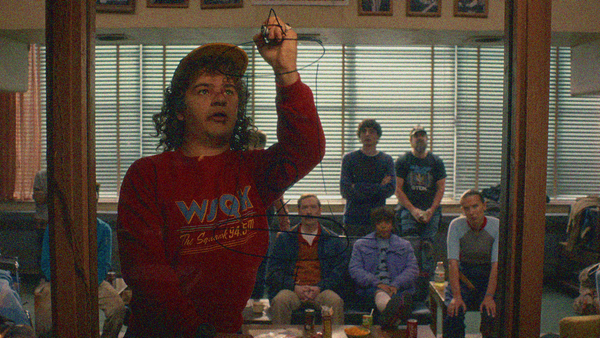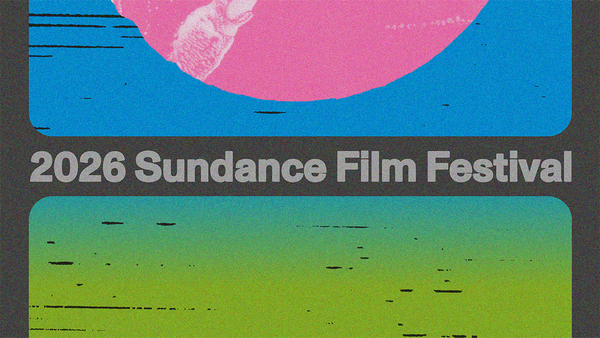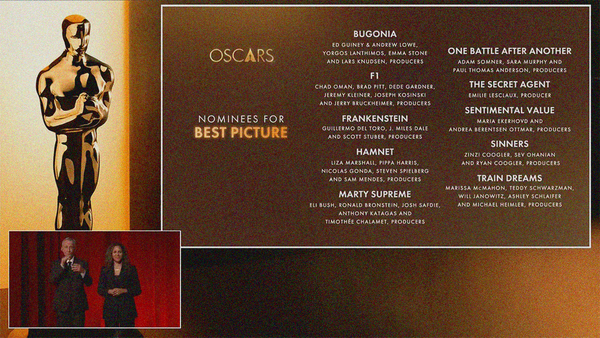Week Ending 8/29/25
Stephen McKinley Henderson at BIFF
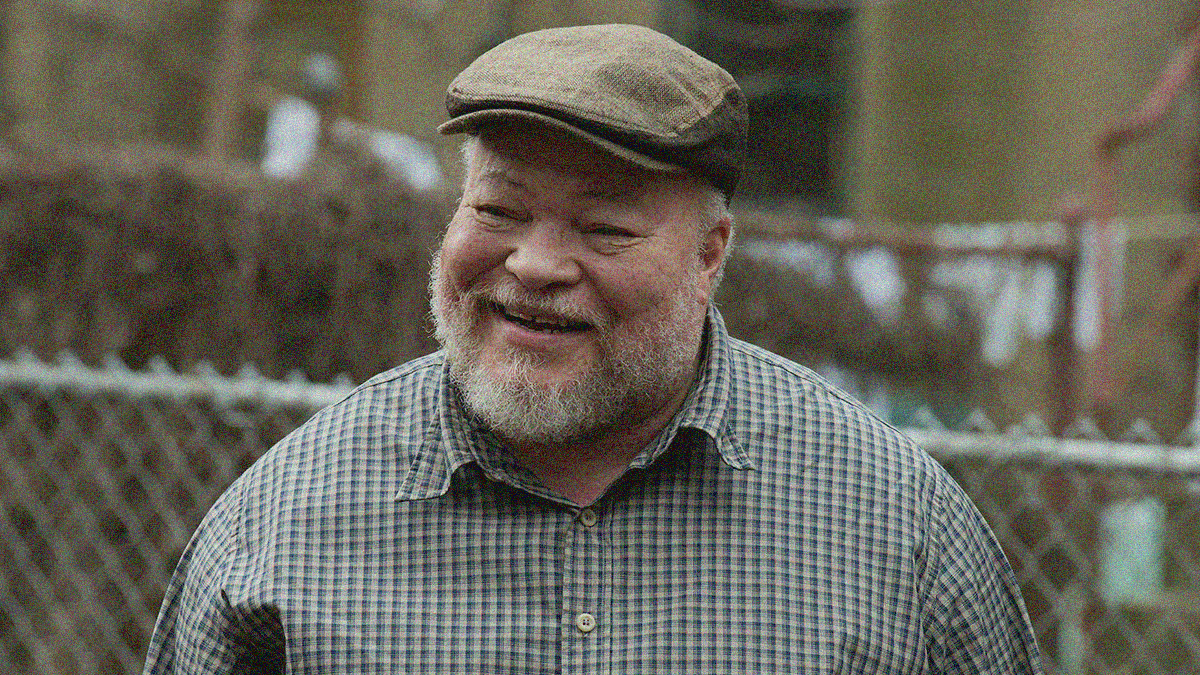
The first time I saw Stephen McKinley Henderson was in the short-lived but entertaining 2008 sci-fi crime drama "New Amsterdam" as the son of an immortal played by a pre-"Game of Thrones"-era Nikolaj Coster-Waldau. He pretty much stole every single scene he was in—prompting me to perform a Google search to discover the rest of his on-screen resume.
Well, at the time, there wasn't much else. Mostly television guest spots leading towards that breakthrough "show regular" gig. But amongst the articles and websites that came up were a ton of mentions of Buffalo, NY. What a wild coincidence.
After training at Juilliard, the Kansas City native became a resident member of the Repertory Theatre of St. Louis until 1981. Shortly after that he found his way to Buffalo, acting in multiple Studio Arena Theatre productions throughout the 80s before eventually finding a teaching opportunity at the University of Buffalo—where he taught until 2016. He never stopped acting, though, eventually earning a 2010 Tony nomination for Actor in a Featured Role for his performance in "Fences" nine years after his Broadway debut in another August Wilson play, "King Hedley II".
Suffice it to say, he blew-up after that. Red Hook Summer, Lincoln, Manchester by the Sea (if memory serves, this was the press screening at Dipson Amherst that he and his wife attended with us), Lady Bird, Dune: Part One, Beau Is Afraid, Civil War, and, of course, Denzel Washington's cinematic adaptation of that breakthrough role in Fences.
Well, it's only right that an institution like the Buffalo International Film Festival would therefore honor Stephen with a Lifetime Achievement Award at this year's festival. The BIFF Legacy Gala occurs on Sunday, October 12 at 7:00pm at the North Park Theatre and commences with a screening of Jim McKay's 2004 film Everyday People, in which McKinley Henderson starred, before culminating in a Q&A with the long-time Buffalo resident.
It's the centerpiece event of this year's installment running October 9-16 with other highlights including Opening Night Gala selection Baristas vs. Billionaires (directed by Mark Mori and showcasing Starbucks union organization in Buffalo) and Closing Night Gala selection The Panic (directed by Daniel Adams and filmed here in the city). The William Fichtner-starring Cutman (directed by Michael Mailer), John Maggio and Neha Shastry-directed The Act of Dreaming (about recently arrived immigrant families adjusting to life in Buffalo), and Paige Bethmann's Remaining Native are also spotlit by the festival as must-sees.
Line-up and ticket information can be found at BIFF's website here.

Hero
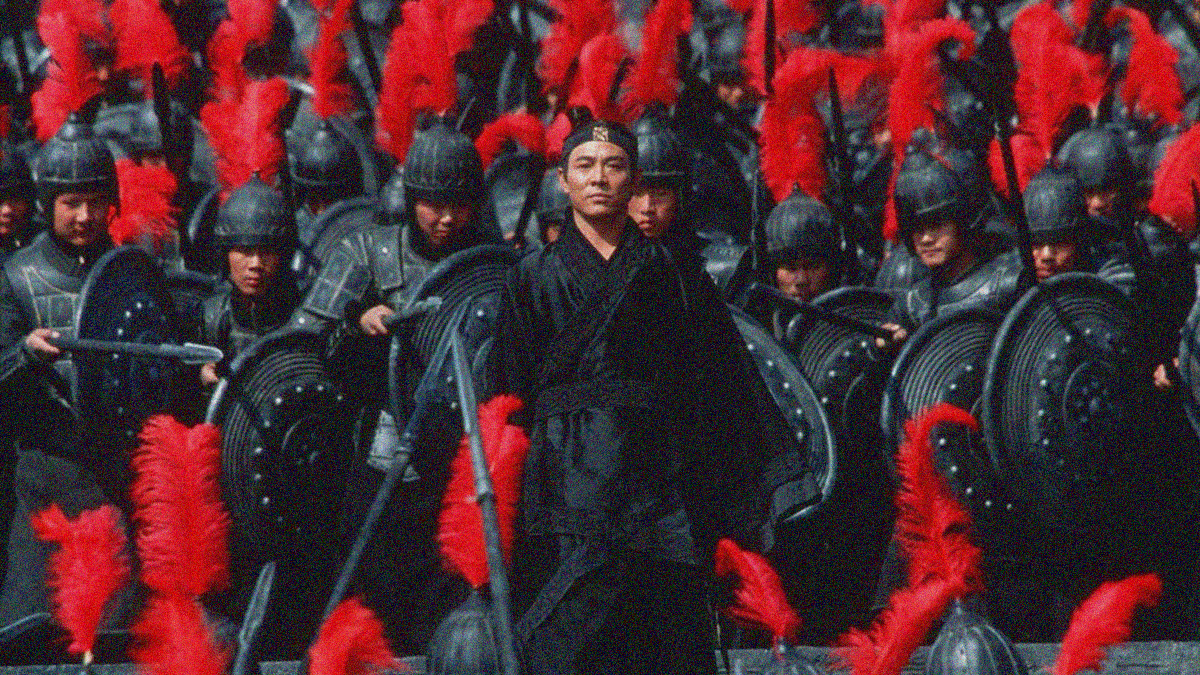
This film should be the universal answer to the meme prompt "post a film still that goes hard." I’m not sure there’s a single frame that wouldn’t fit the bill.
Just a visually gorgeous work of art. What a move to recolor every iteration of every story to set their respective moods apart. And you must love the timeless message at its heart about uniting through peace rather than blood.
Sadly, mankind rarely (if ever) allows that utopian vision to come true. Tyrants be tyrants and rebels be justifiably vengeful. It’s one thing to appreciate the sentiment, but another to put it into action knowing you’ll probably be dead courtesy of a coup tomorrow. Hence why Jet Li’s Nameless endures to earn the title Hero.
Best ensemble cast of 2002? I wouldn’t discount it. Although Gosford Park and Fellowship are each a bit too sprawlingly insane to leapfrog over.
8/10
A Little Prayer
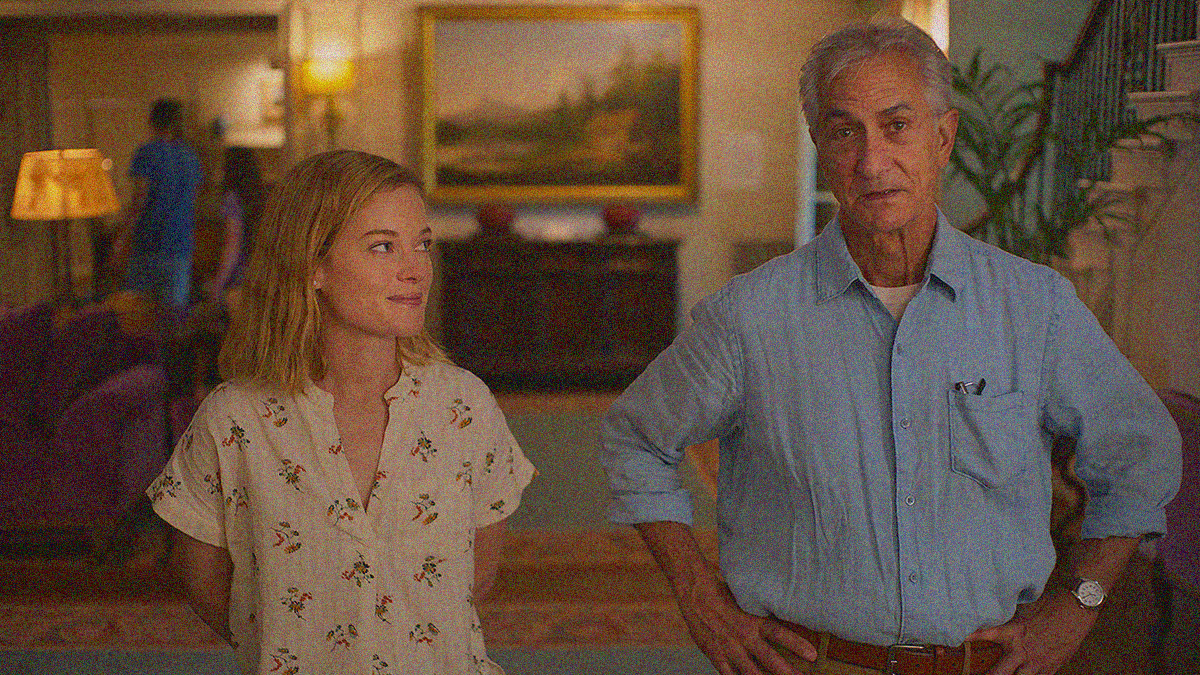
Bill (David Strathairn) cherishes the small things in life. An unknown woman singing at the top of her lungs while passing by the house at 7:30 in the morning. A good painting. An evening cup of tea. He gravitates towards his daughter-in-law Tammy (Jane Levy) as a result because the rest of his family doesn't have time for such seemingly trivial things like them. They don't understand the beauty and quiet calm of simply being in this place of deep, albeit often unspoken, love.
His wife Venida (Celia Weston) would have him call the police on that singer. His daughter Patti (Anna Camp) is a selfish mess who uses her own daughter as a bargaining chip to both get what she needs from her parents (money) and her own troubled husband. And his son David (Will Pullen)—Tammy's husband—can barely be bothered to be present in their home beyond the time it takes to grab his lunch in the morning and stumble into bed at night.
What makes Angus MacLachlan's A Little Prayer so good, however, is that it never judges any of these characters. It doesn't put Bill or Tammy on a pedestal as far as them being better than their louder, more chaotic brethren. It merely seeks to express the complexity inherent to finding a balance between one's insular life and the communal whole. Because they do all love each other. They just can't always express it or honor it as effectively as they might hope. Some of it is nature. Some of it is nurture. All of it is the unfortunate reality that trying isn't enough.
You can't exonerate Bill from being a cause of the drama either. Who he is now is not who he always was. We see it in the way he struggles to fully confront David about what he's certain is an affair with their family company's secretary (Dascha Polanco's Narcedalia). We see it more when Venida confronts him about what he's not telling her about their son and all but confirms he had a similar fling himself. Then there's Bill's moment of clarity when considering what to do with Patti. He wonders aloud if he was a bad, absent father. And rather than assure him of the opposite, his wife can only admit he "did what he had to do."
Add war (both Bill and David are veterans who treat their employees to drinks every Wednesday at the local VFW) and you could presume MacLachlan is setting up a list of excuses for his characters to hide behind. What his script does instead, though, is prove how we must take personal responsibility for our actions regardless of the suffering, sacrifice, or self-loathing that contributes to them. Because actions have consequences. It's something Bill attempts to remind David about despite the latter knowing full well since his existence is in many ways a consequence of his father's.
There is no absolution as a result. Unfortunately, there's only pain. The hope is that time can bring clarity and acceptance considering forgiveness is perhaps a bridge too far. We assume Venida forgave Bill and they've gotten past his transgressions enough to build a nice life. But there's also mention of a fallen comrade's ex-wife showing up at his funeral that reminds us how an inability to forgive doesn't automatically erase the love shared. Some people can't be helped—at least not yet. So, you must let them go to not fall into darkness yourself.
A Little Prayer is a film of parallels that works to expose the many forms this dynamic takes. Venida stuck by Bill and they overcame it together. Patti continues to stick by her husband despite the damage he causes and has pretty much been dragged down with him. Narcedalia has reached a point where she can no longer accept who David becomes when they are together and knows escape is the only chance she has for survival. And Tammy is still weighing her options. Can she still be David's Venida? Or is he too far gone?
Don't think little Hadley (Billie Roy) is merely as a mirror for her mother (Patti) and David either. Yes, she serves that purpose considering Bill admits her personality is a direct result of an unhealthy home (he provided a similar one for his own kids). No, she also feeds the question about bringing more children into such volatile circumstances. It's a delicate yet crucial topic that MacLachlan handles well to again not pass judgment. Because, regardless of your stance on abortion broadly or case-by-case, a woman's choice should remain paramount.
In many ways, the film is about Bill coming to terms with that fact. Not just how it concerns a potential grandchild, but also how it infers upon his ability to relinquish control. It's another facet of his past that David throws in his face and one Venida tries to broach when telling him it would probably be prudent not to give their daughter money this time. He wants to drag his kids into goodness forgetting that he had to pull himself up to get there himself. Bill can only ensure he's present to offer them protection when they need it.
So, rather than selfishly believe he has all the answers or the control to dictate terms with anyone other than himself, he confronts the reality of his helplessness. He's helpless to correct his own mistakes or those of his children. All he can do is recognize himself in David and Venida in Tammy and know the difficult truth of where they are and the uncertainty of where they're headed. It culminates in an unforgettable final scene between Strathairn and Levy that delivers the emotional release they've been desperate to achieve and the permission to let go.
8/10
Sanatorium Under the Sign of the Hourglass
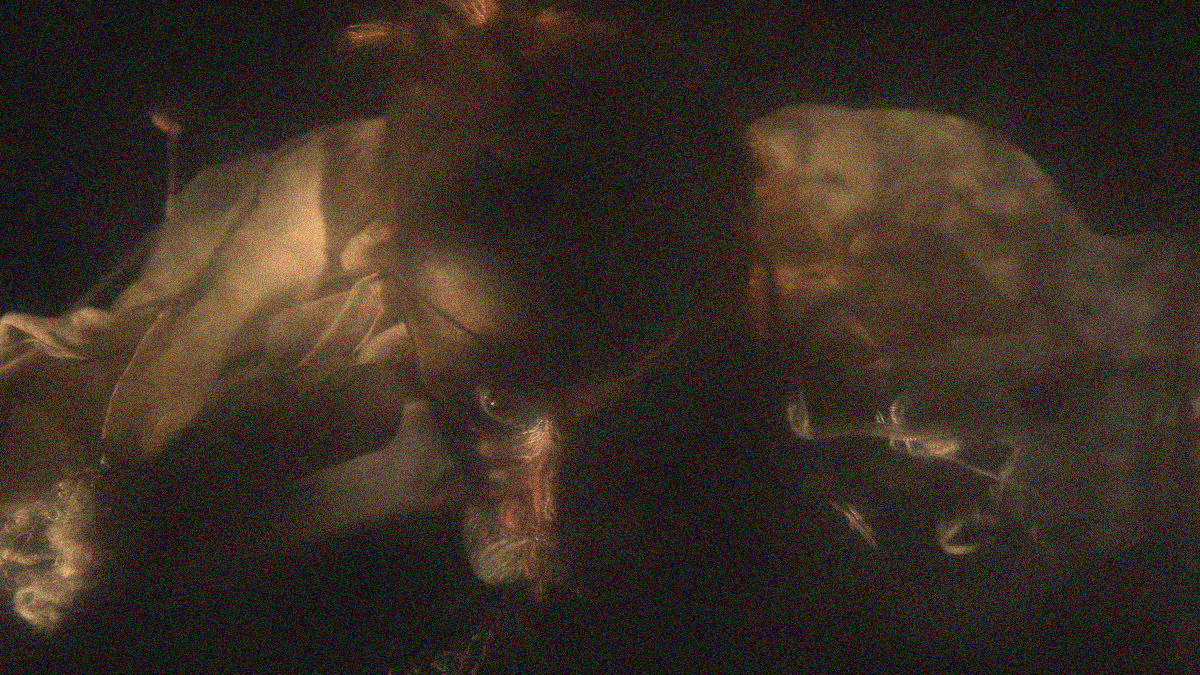
It's been twenty-plus years since I binged the surreal short film collection of The Quay Brothers (alongside those of Jan Švankmajer). As someone who grew up on Disney animation and Will Vinton Studios claymation, it was an unsurprisingly eye-opening experience. The atmosphere. The textures. The hand-crafted, nightmarish figures and sets. The weirder and more obtuse the narrative, the better it felt. Because the vibes were captivating enough.
Well, I'm happy to say Stephen and Timothy Quay haven't changed. Back with their first feature-length film in almost as long, Sanatorium Under the Sign of the Hourglass is what they call "an exploration of motifs and themes taken from the mytho-poetic writings of Bruno Schulz integrating both puppets and live-action to score the demiurgic nervature of Schulz’s 13th apocryphal month in the Regions of the Great Heresy." Considering I'd understand that description just as well in Polish (a language I don't speak) has me assuming viewers familiar with the source material will fare better.
Even so, this adaptation of Schulz's dreamlike collection of short stories is obviously suited to the Quays' unique sensibilities. The notion of a man visiting his deceased father in a sanatorium whose temporal environment is intentionally slowed so that the latter isn't yet dead within its walls is perfectly suited for their creepily dark aesthetic. Whether you fully comprehend what occurs within that context will vary. (I certainly did not.)
The film is structured on three tiers. The first concerns an auctioneer (Tadeusz Janiszewski) who's arrived home to find a mysterious metal contraption on his desk with a note describing its purpose. Said to contain a person's retina, its seven random portholes are positioned to supply a window into the last seven images the eye witnessed. And on one specific night (which happens to be this one), the sun will shine just right to liquify the specimen and inexplicably animate the scenes immortalized.
The second is a man named Jozef (Andrzej Kłak) who has arrived to see the body of his father. The third is that same man ("J") as a puppet who's come by train for the same. It's this last character that we follow for the majority of the runtime—a sort of otherworldly manifestation of the second that's simultaneously a construct of his mind and the anomalous magic of this ghostly place. When "J" falls asleep, we return to Jozef. When Jozef becomes confounded by his surroundings, we return to the auctioneer attempting to process what he's seen.
There's a lot of repetition via echo with many sequences replayed with the camera either zooming in or out with each subsequent loop. The live-action footage with Jozef often has a stop-motion feel to it too as a result—especially when "J" loses his hat and the image flips upside to flicker between these worlds. We meet a six-armed doctor, a horned figure, and "J's" father. We watch memories, metaphors, and processions. We witness a man losing himself to impossibility's allure.
I'm not one to even try to put the plot (if you can even call it that) into words. Half the time I wasn't sure who I was looking at let alone their relationship to the other characters considering many were alternate versions of my current point of focus anyway. So, you should probably treat the Quays' work as a companion to Schulz’s novel rather than a replacement for it. Or you can simply enjoy the artistry by letting its horror-fueled hallucination wash over you like I did.
I was going to like it regardless since I'm a sucker for the craft. The use of light and the dust floating in its beams is gorgeous alone, but integrating its true passage of time with puppets lurching through their false time is awe-inspiring stuff. And the attention to detail in its dirty, scratched, and scuffed textures lends the whole a tactility you simply don't get with mainstream animation.
7/10
Stranger Eyes
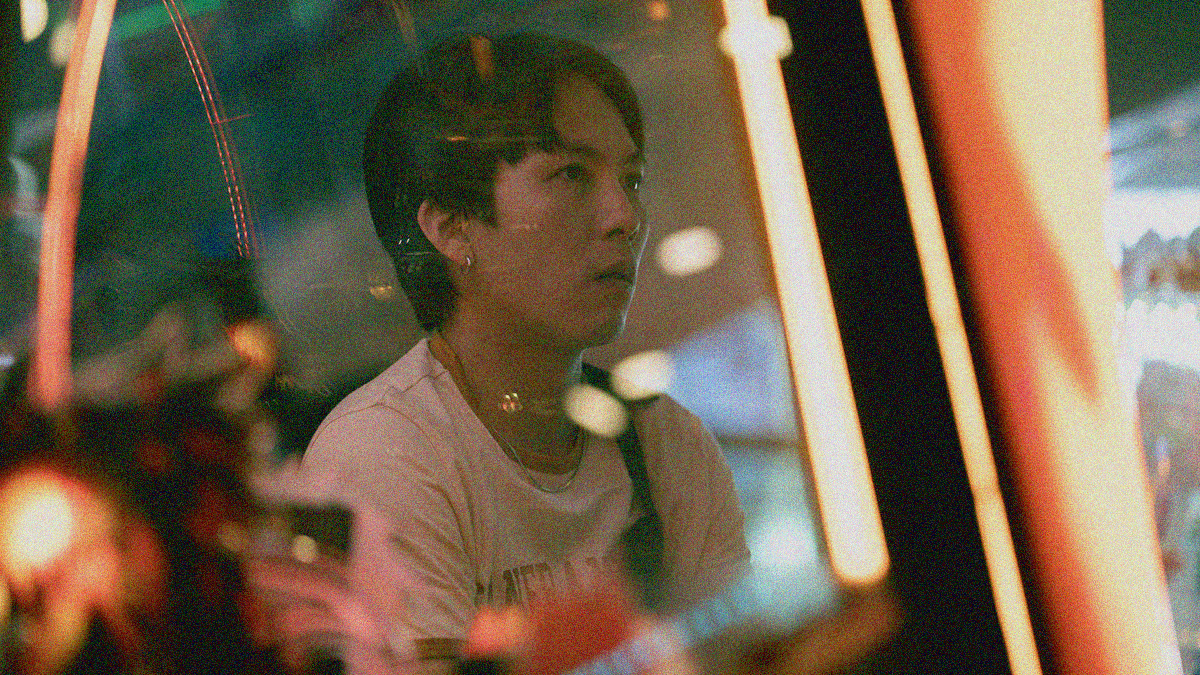
Surveillance is at the heart of Yeo Siew Hua's Stranger Eyes. The voyeurism of an unknown entity capturing intimate moments of Junyang (Chien-Ho Wu) and Peiying's (Anicca Panna) lives before leaving DVD copies under their door. Government, corporate, and private security cameras running 24/7 from carefully measured perches. The voluntary decision to broadcast ourselves via livestreams and social media. Privacy as a concept has been so eroded with the rapid advancement of technology that we've unwittingly hammered in the last nail ourselves to make an attempt at maintaining some semblance of control.
The opening scene provides a perfect example of the overlap as Junyang's mother Shuping (Vera Chen) giddily captures her granddaughter with her cellphone. Is her doting a means of archiving history for the toddler's future use? Or is it simply for herself as a means to show off to her own "following" by posting videos online now? Peiying is quick to request she not put these moments on the internet because Little Bo deserves to make that decision herself when she's older. The line that separates ease from necessity is thin. A proud grandma can show her love to the world with the press of a button. But should she?
Enter Officer Zheng (Pete Teo) and his entertainingly patronizing tone when dealing with Junyang, Peiying, and Shuping upon Bo's disappearance. He begs them to let the police do their job sifting through clues with patience because he knows that same technology has made civilians think they can do what detectives do better and faster. So, he rubs it in their faces when half-baked plans to do just that blow up in their faces and laughs to himself about the reality that hiding has become impossible. Surveillance is simply too prolific for anyone to believe they can commit a crime without getting caught.
The problem is our definition of a crime in relation to that shifting bar of privacy. Is Lao Wu (Kang-sheng Lee) committing one when filming Junyang at a mall without his permission? Maybe. I guess it really depends on what he does with the footage. Broadcasting it would be. Blackmailing the subject with it would be. But keeping it for himself? Things become grayer. Especially when one could construe the footage he's captured is of Junyang committing crimes himself. When does a stalker become a Good Samaritan? The moment their loathsome behavior inexplicably proves beneficial to the victim's needs.
Because what if we discover Lao Wu's objective creep didn't take Bo? The shift from finding him disgusting to potentially discovering that he can be a hero due to his stalking capturing the real kidnapper would give whiplash to even the strongest neck. Welcome to a world moving way too fast to be able to fully process stakes and consequences without proper hindsight and context. It's why Teo's cop can be the comic relief to the drama rather than an immovable voice of authority. In the past, victims had no alternative but to wait. Now, they often make cases harder via their amateurish meddling.
But that's just one angle that Yeo takes with Stranger Eyes. It's not even the main one despite our assumption being that Bo would take precedence above everything else. No, the script is more interested in how our self-imposed surveillance states allow us to both find escape from our troubles and create new ones. It's about the parallels between Junyang and Lao Wu as fathers with the latter following the former less as a means to punish him by exposing his transgressions than to prevent him from making the same mistakes he did. It's Junyang and Peiying's attempts to reconcile parenthood with independence.
One engages in physical affairs. The other in an emotional one. Why? To be seen as more than a husband or wife or mom or dad. To be seen as free and unencumbered. To flirt. To create. And through those pursuits you have Lao Wu as the voyeur witnessing it all—clandestinely with Junyang and publicly with Peiying courtesy of her streams (I can't tell if the static chat feed means no one else is watching or that the filmmakers didn't realize those interfaces are constantly in motion beyond the main video feed). It might feel weird to acknowledge, but he's kind of their victim too.
My sole issue with the film is that we do heavily invest in Bo and the fact that she becomes a MacGuffin makes it difficult to fully appreciate the reasons why. The epilogue helps in this regard (Act One is from Junyang's perspective, Act Two from Lao Wu's, and Act Three the culmination of their secretive interactions with each other) by driving home the aforementioned parallels with dialogue, a pivot to security cam perspectives, and Xenia Tan's Ling Po, but it's still strange to totally disengage from a missing child mystery. Despite the resulting disorientation, the overarching theme and complex characterizations do prevail.
7/10
The Toxic Avenger
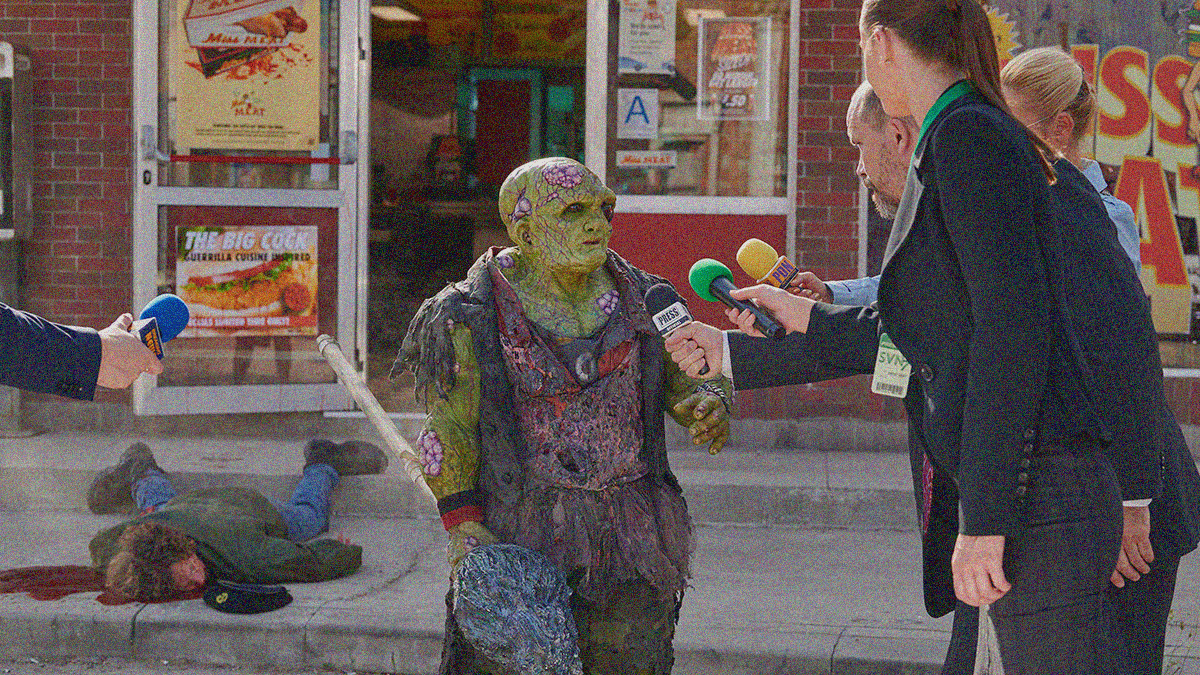
What was an 80s-era coked-up sex comedy is now a stock-driven environmental disaster splatter fest as writer/director Macon Blair transforms The Toxic Avenger from virgin co-ed to emotionally drowning dad. The radioactive origin of the titular hero's invulnerability is therefore more than just a background gag of two idiots transporting waste barrels sans lids. It's now very specifically the lethal runoff from a billion-dollar health magnate's enterprise that's backed by the mob. So, while the political machine still resides in one man's pocket, he's firmly planted in one too.
The man: Bob Garbinger (Kevin Bacon). Far from the sharpest tool in the shed, he's more the "face" than "brains" behind the operation. The obvious move would be giving that title to his associate Kissy Sturnevan (Julia Davis), but her days seem to just be spent salivating over that aforementioned body. Suffice it to say, their finances don't look good. Some of that is the result of stagnating market share courtesy of a dead product line. Some of it is intrepid reporter J.J. Doherty (Taylour Paige) exposing their destructive modes of operation.
So, while he treads water glad-handing municipal big wigs, Bob is trying not to lose his own head to mob boss Thad Barkabus (Jonny Coyne). The former wreaks havoc upon the populace via consumer culture influence while the latter intimidates property owners to cede over land. Bob has a metalcore band (don't call them rock) known as The Killer Nutz moonlighting as his inept assassins under the command of his Riff Raff-looking brother (and their manager) Fritz (Elijah Wood). Thad has his Ivy League, khaki-wearing son strong-arming defenseless old women.
Running parallel are Winston's (Peter Dinklage) attempts to keep his head above water as a single stepdad to his late love's son, Wade (Jacob Tremblay). He hopes to inspire the boy to get over his stage fright and find the confidence his mother had in spades, but it's tough to set an example when his knee-jerk reaction to injustice is to simply look away. Winston is desperate to make a difference, though, because a recent diagnosis says Wade will be an orphan in six-to-twelve months. And this world being a hyper-stylized devolution of our own means health insurance surely won't help.
One thing leads to another and Winston's meek janitor becomes the powerful mutant endearingly known as "Toxie" once his desire to be a good example for Wade finally acquires the strength to do so. Partnering up with J.J. to take Bob down (both with a personal and societal grudge against him), Blair sets them on a similar path as the original Lloyd Kaufman film as far as saving a restaurant from homicidal maniacs (radicalized misogynists for whom the name change from Mr. Beef to Miss Beef proves a bridge too far) and battling The Warriors rejects in the streets. The blood never stops.
Blair leans heavily into the gore as Toxie (played by Luisa Guerreiro with Dinklage still providing the voice) holds nothing back when confronted by a villain threatening his son and/or their community. And since the only opposite sex pairings are Kissy's unrequited lusting over Bob and Toxie working with the much younger J.J., the sex quotient is nearly dialed to zero besides a flashing sequence during a concert. Because, despite the increased violence, this iteration is also focused on dialing up the heart.
To do so, however, is to pivot away from St. Roma banding together to save Toxie and towards Toxie saving Wade. That also means supplying him a bigger baddie than a corrupt mayor with a bullhorn (try to spot the "Belgoody Bail Bond" Easter Egg). Bacon is having a blast fulfilling that role, but the decision to go full comic book movie by forcing a mutant-on-mutant climactic battle is pretty tired (extra points for the Batman v Superman gag, though). Thankfully, we're not here for solid storytelling (the original might actually be smarter). We're here for fun.
The Toxic Avenger doesn't disappoint on that front due in large part to some fantastic peripheral characters. Wood is a lot of fun as the just-because-he-looks-evil-doesn't-mean-he's-a-monster lackey. Abraham Lewis as Thad's son is polo douche perfection. And David Yow's "Wise Hobo" is always good for a laugh being that he's as wild card as it gets. That's saying something for a film with so much going on that the on-screen expositional text overwhelms with its myriad adverbs and in-jokes. I'm just glad Nutz's designated breakdancer never stops flipping.
Blair ultimately delivers more love letter than true standalone with something new to say. Yes, it tightens the corruption angle by focusing on the aftermath of post-capitalist greed in which we're currently mired, but I saw so much of Trump in Mayor Belgoody that its predecessor might inexplicably prove timelier. The misogyny is nicely flipped to call out misogynists (I loved Lee Eddy taking the piss out of a grumpy Ev Lunning during every TV news report) and the relationship between Winston and Wade is a nice touch, but the real takeaway is the gore. Honestly, that's probably all fans wanted anyway.
6/10

This week saw Battle: Los Angeles (2011), Calendar Girl (1993), Epic Movie (2007), Escape Room: Tournament of Champions (2021), and The Woman in Red (1984) added to the archive (cinematicfbombs.com).
Jason Priestley using f-bombs as a teaching tool in Calendar Girl.

Opening Buffalo-area theaters 8/29/25 -
• American Sweatshop at Regal Transit, Quaker
• Caught Stealing at Dipson Amherst, Flix, Capitol; AMC Maple Ridge, Market Arcade; Regal Elmwood, Transit, Galleria, Quaker
• Hridayapoorvam at Regal Elmwood
• Jaws: 50th Anniversary at Dipson Flix, Capitol; AMC Maple Ridge, Market Arcade; Regal Elmwood, Transit, Galleria, Quaker
"It doesn't matter how prepared or determined they are because they're still just vulnerable humans caught in the path of a killing machine devoid of remorse. That's Jaws' beauty. In the end, we don't know if our heroes will succeed on their mission or survive. Rather than a supernatural monster playing by its own rules, this beast plays by ours. There's nothing scarier than that." – Full thoughts at jaredmobarak.com.
• Leaving Mom (Mang Me Di Bo) at Regal Galleria
• Lokah - Chapter 1: Chandra at Regal Elmwood
• Maa Jaye at Regal Elmwood
• Odum Kuthira Chadum Kuthira at Regal Elmwood
• Param Sundari at Regal Elmwood
• The Roses at North Park Theatre; Dipson Amherst, Flix, Capitol; AMC Maple Ridge, Market Arcade; Regal Elmwood, Transit, Galleria, Quaker
• Run at Regal Quaker
• Sundarakanda at Regal Elmwood
• The Toxic Avenger (Unrated) at Dipson Flix, Capitol; Regal Elmwood, Transit, Galleria, Quaker
Full thoughts are above.
Streaming from 8/29/25 -
• Enemigos (Prime) - 8/29
• Hell of a Summer (Hulu) - 8/29
• Love Untangled (Netflix) - 8/29
• Songs of Paradise (Prime) - 8/29
• The Twin (Shudder) - 8/29
• Trail of Vengeance (Hulu) - 8/29
• Unknown Number: The High School Catfish (Netflix) - 8/29
• Vice is Broke (MUBI) - 8/29
• Emmanuelle (HBO Max) - 9/1
• Ghost Cat Anzu (HBO Max) - 9/1
• Winter Spring Summer or Fall (Paramount+) - 9/1
• Lilo & Stitch (Disney+) - 9/3
Now on VOD/Digital HD -
• Fluxx (8/26)
• The Home (8/26)
• I Know What You Did Last Summer (8/26)
• It's Never Over, Jeff Buckley (8/26)
• Oh, Hi! (8/26)
"I loved the parts I loved and I was bored by the parts that added nothing to the central question. The absurdity might be fun, but Gordon and Lerman’s shared complexity is what intrigues." – Full thoughts at HHYS.
• Robin and the Hoods (8/26)
• She Rides Shotgun (8/26)
"Anyone who’s seen Nick Rowland’s Calm with Horses will be happy to hear he’s found another script with similar gravitas and complexity insofar as its familial love caught within a crime thriller premise." – Full thoughts at HHYS.
• Sketch (8/26)
"This adventure through the emotions of grief is very much in that vein [of 80s/90s family fare] both in its imaginatively dark fantasy world-building and its heartfelt empathy between unlikely companions banding together to achieve a common goal." – Full thoughts at HHYS.
• To a Land Unknown (8/26)
"Sabbah’s performance is the linchpin as a result. He’s the film’s moral compass. Bakri’s portrayal is so hardened and myopic [since] has no future without Reda’s innocence because he’s already sacrificed his own." – Full thoughts at HHYS.
• Together (8/26)
• American Warrior (8/29)
• Red Sonja (8/29)
• What We Hide (8/29)

Pieces from the The Cook, the Thief, His Wife & Her Lover (1989) press kit.
